Mary Alford took a second shot at life – and won
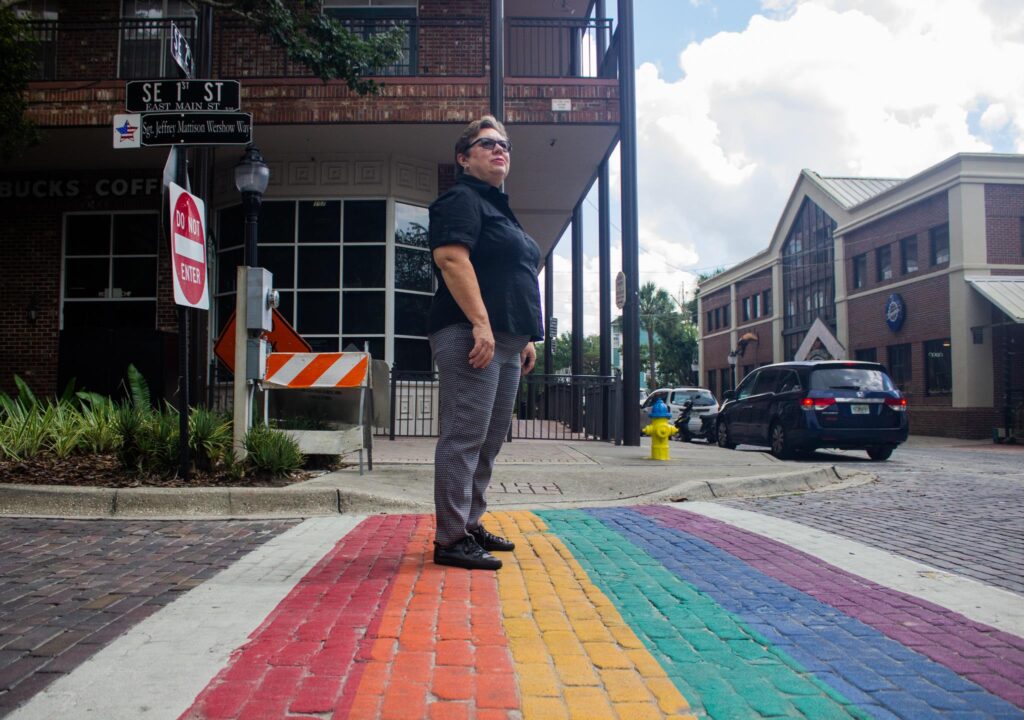
Alford has grown to embrace her sexuality as a distinctive part of her identity, despite growing up in a religion that believes it is sinful. (Sara Breske/Atrium)
This is one of two stories on Alachua County commissioners. Click here to discover how Charles Chestnut continues to dismantle racial barriers in the Gainesville area.
November 4, 2021 | By Jenn Hayes
Mary Alford was barely 18 on her wedding day. A devout member of The Church of Jesus Christ of Latter-day Saints – widely known as the Mormon church – she felt pressured by her bishop to marry as soon as she finished high school.
And so, in the Washington D.C. Temple, a massive white marble structure with gold spires soaring to heaven, she and her husband were ostensibly “sealed” for eternity by the same institution that deems “homosexual behavior” a serious sin.
Now, at 60, Alford is the first openly LBGTQ+ person to ever serve on the Alachua County Commission. She was elected in 2020 for a four-year term.
Back then, Alford was afraid. She knew she was drawn to women, but she didn’t have any gay role models. “And so,” she said, “six weeks after my high school graduation, I was married, because that’s what the church told me to do.”
But things did not work out as the church had deemed. In the years since, she has defied the social expectations of her earlier life.
Alford is a sixth-generation Floridian and the first of nine children in her family. Her father was an electrician, a Scoutmaster and a conservative man who valued hard work. Her mother took a job in-patient services at the UF Health Shands Hospital, working the night shift to support their family as it grew.
As the eldest child, Alford was a force in the family, said her sister Wendy Hill. When Hill sliced open an artery in a freak accident involving a fish tank, Alford was calm. She took Hill to the shower, bandaged the cut and drove her to the hospital. She always marshaled her younger siblings.
Alford, too, planned a large family. She was pregnant within months of being married; she gave birth to four boys in six years. In her religious community, there was “an expectation,” she said, to stay home and be a mom. To take care of her children the same way she took care of her siblings. She didn’t have a car or a clothes dryer. She baked bread, sewed her family’s clothes and kept a garden. And she read books.
By the time she gave birth to her fourth child, she said, “I was bored.”
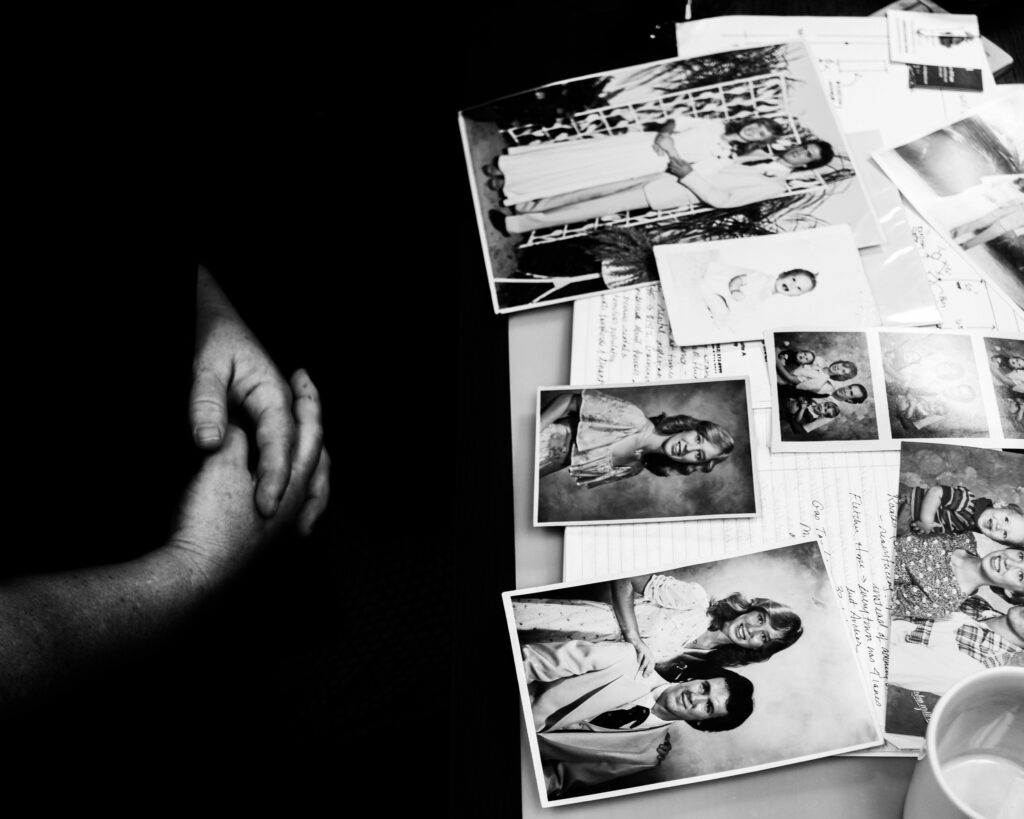
Alford felt the pressure to marry young from her Mormon upbringing. (Apoorva Thapa/Atrium)
Alford had expected to go to college, to start a career. She wanted to be a writer, an astronaut or a scientist like Marie Curie. She took college courses when she was in high school. But as a young married woman in the church, she found that men didn’t take her seriously.
“I could have wonderful conversations with women,” she said, “but if I ever tried to join a conversation with men, if they were talking about something interesting, they would just look at me like, ‘Why are you talking?’”
Alford saw how women were treated in her church. And she started to become interested in women’s rights — to be heard and treated as intellectual equals. Eventually, she identified as a feminist.
‘He didn’t have any faith in my abilities.’
As her children grew older, Alford decided it was time to expand her sphere beyond the home. She got a part-time job in the Neonatal Intensive Care Unit at Shands. The job improved her self-esteem as she made contact with the outside world.
She enjoyed going back to work.
“It was just like, this giant sigh for my soul to go out and be able to have other people view me as a valued member of society,” she said.
She started to question the church and its teachings, to rethink her views on abortion and reproductive health, and enrolled in classes at Santa Fe College. When she told her husband about her thoughts and plans for herself, he “hit the roof.” He discouraged her; he told her she was bound to fail.
“He didn’t have any faith in my abilities,” she said. “Just because I stayed home with kids for 10 years didn’t mean I wasn’t smart.”
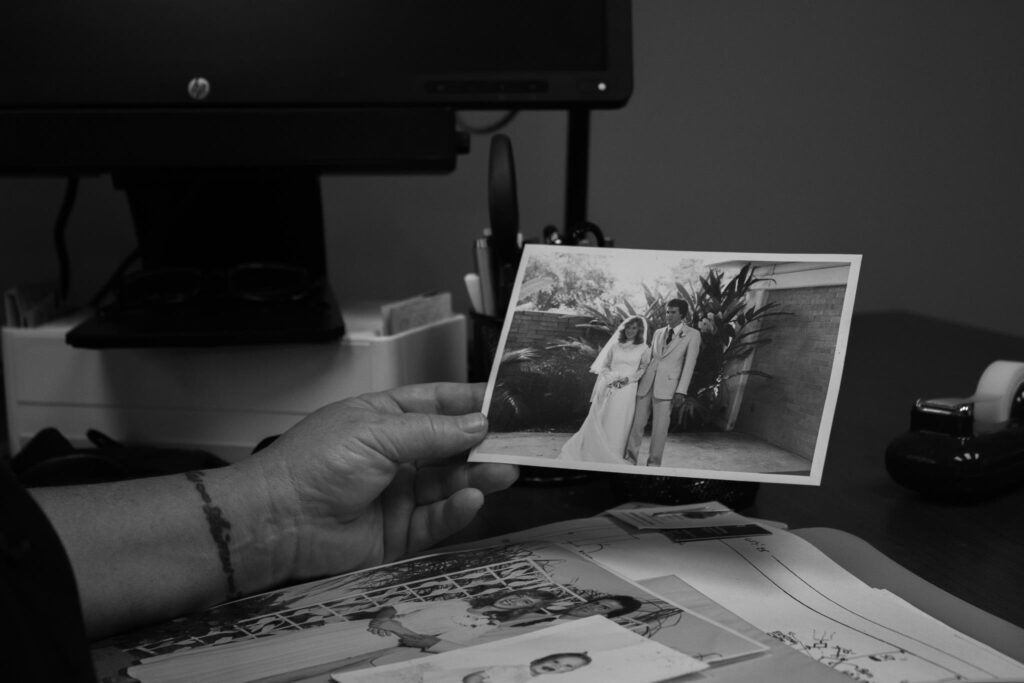
Alford reflects on her past marriage, knowing she was attracted to women but also afraid to openly embrace her true identity. (Sarah Breske/Atrium)
By the time Alford was 28, she was a single woman. And within the next few years, she came out to her family and her friends — her true friends — as a lesbian. Outside the bounds of the church, she found support.
After her divorce, Alford was “disfellowshipped” from her religious community, just one step short of excommunication. When she called old friends, they were polite but made excuses to get off the phone quickly.
Now, Alford refers to herself sometimes as an ex-Mormon and sometimes as a recovering Mormon. Her feelings about the church remain mixed. It did teach her a strong work ethic, she said. It helped her set goals and strive constantly to be a better person.
But that included being true to herself.
That presence of mind became essential to her after her divorce. She switched from a physician assistant program to environmental science when a professor told her about a full-tuition scholarship. She’d always delighted in Alachua County’s landscape. She loved science and she had grown up around farms, electrical infrastructure and well water. It was a good fit. She earned her master’s degree and worked at Gainesville Regional Utilities and Progress Energy.
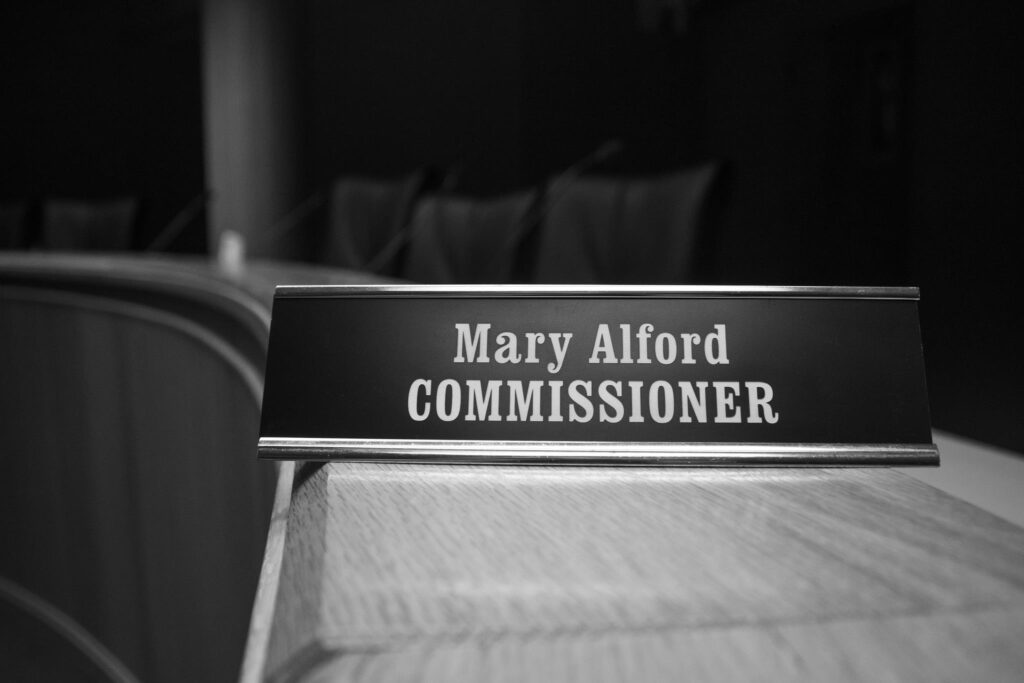
With a sense of ambition that can’t be stopped by illness or prejudice, Alford brings big
plans to the table as a county commissioner. (Sarah Breske/Atrium)
Cancer and the county commission
But then came cancer. It was one of the most difficult times of her life, and it forced her to reconsider her priorities. Alford comes from a family of farmers; she was born at a time when fields were routinely sprayed with carcinogenic chemicals like DDT. Her father, son and brother all died of cancer, and her mother is now fighting liver cancer, which has metastasized to her spine.
Alford had seen the financial and emotional toll that health crises take on families, and how the environment, people and policy are linked. She wanted to use her education to make her community a better place. Environmental issues, she believed, are inseparable from questions of justice. She refocused her career around sustainability and opened her own business outside the energy sector. She trained on green building certification and became an expert and consultant in sustainability. That’s how she found her way to the county commission.
Alford decided to run for office as she became increasingly frustrated with her inability to drive policy through volunteering, advisory boards or expert testimony. She saw that decisions about sustainable development often ended up in front of the county commission and wanted a seat at that table.
Despite her family’s personal differences, they still supported Alford. Her sister Hill is a lifelong Republican, just like their dad was, while Alford calls herself a progressive Democrat, a proponent of the Green New Deal. The sisters disagree on the Second Amendment, real estate development, Donald Trump and “telling people what to do.” But, Hill said, “It’s not like I want to cut down all the trees in Alachua County.” In this case, politics didn’t supersede family — Hill admits she voted for her sister.
“I thought she would run for mayor,” Hill said, “but I think she can learn more in the seat she’s in.”

Alford’s favorite mug says “Nasty Woman Commissioner.” She thinks it’s a comical representation of her position. (Apoorva Thapa/Atrium)
In 2020, Alford beat Mike Byerly, a 20-year incumbent, in the Democratic primary for the Alachua County Commission District 1 seat. Alford didn’t expect to win and was surprised at the wide margin of votes. Her general election victory along with Anna Prizzia’s in District 3 also ushered in a female-majority commission, the second in the county’s history.
Like her political role model, Massachusetts Sen. Elizabeth Warren, Alford came into office with policy plans. A year later, she’s started to see them come to fruition. Her plan to push landlords to upgrade rental units, raise energy efficiency standards and lower tenant utility bills has been funded for a $500,000 pilot. If successful, it will scale up into a multi-million-dollar county-wide program.
Being a commissioner, she said, “is not the part-time job they advertised.” She can’t research every issue as thoroughly as she wants, answer all her emails, entertain hour-long phone calls and do the New York Times crossword.
And as is the case with most politicians, there are detractors. When Alford was campaigning, critics ridiculed her appearance and weight — a kind of scrutiny that’s familiar to many women in politics. Livestreamed county commission meetings on Facebook continue to draw vicious exchanges between the commission’s defenders and those who view them — Alford included — as too far left. Arguments about masks, COVID-19 vaccines, utilities and property taxes have grown contentious; meanwhile, a vocal contingent has suggested creating a new county.
The divisiveness bothers Alford; it knocks her off-kilter. In August, she left town for a few days to decompress, alone. She wasn’t expecting to need breaks like this, she admits, “but I really need to be able to maintain perspective.”
She didn’t want to reveal where she went. Even as she draws boundaries, she knows they’re fragile.
“I’m headed South,” she said before the trip. “I have two people that know how to get in touch with me.”
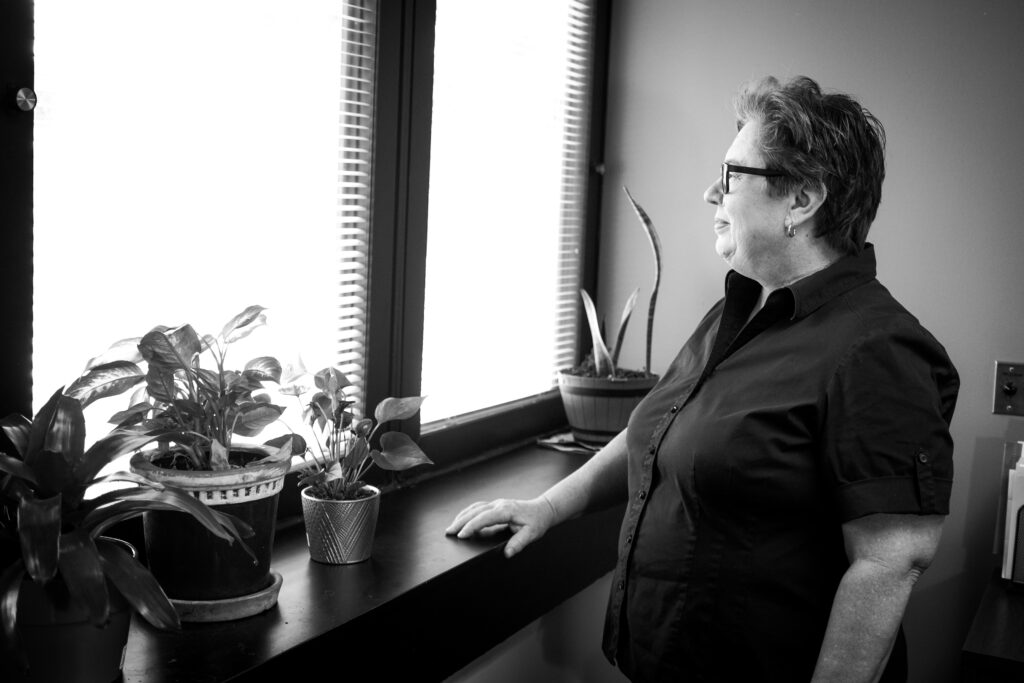
Alford looks back on her life with a strong sense of accomplishment. She never thought she’d be where she was back when she was still with the church. (Apoorva Thapa/Atrium)
Keeping the past in sight
Alford is hardly the woman she was as a young wife. But she still reaches for the familiar things that kept her sane. She likes to garden, cook and sew. She talks to her family almost every day. She never wants to forget herself again, to lose sight of the values that drive her. And sometimes, that requires taking space and time to sort things out.
But it shouldn’t take her too long. Being a new commissioner, Alford said, was like “being shot out of a cannon.” In the year since she started, she has come a long way, though she is still learning the political landscape of Alachua County and the commission’s policies and procedures. But most of all, after all these years, she’s learning to give herself some grace.
Inspiring! Go Mary!!